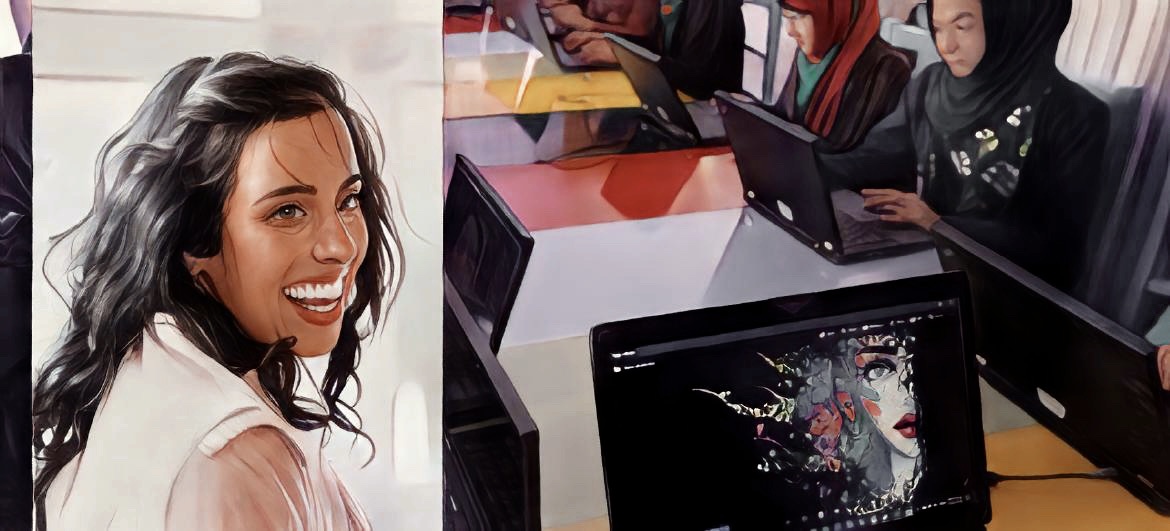Lecture Me! Refugee women’s experiences with technology shock
Professor Dahya, from the ICCIT faculty at UTM, delivers a talk about women’s experiences navigating refugee resettlement.
Imagine you arrive in a new country, and you do not have your phone. You cannot call or text anyone, you cannot search up the route to your hotel or Airbnb, and you cannot translate how to ask the locals where the nearest bus stop is. Many refugees feel lost and cut off from all technology upon their arrival to their countries of asylum. Many do not even know how to use the technology presented to them during their resettlement. Women in particular face a number of problems when learning to navigate unfamiliar technology in a new country with an unknown language.
A refugee is a legal term defined by the United Nations Refugee Agency as someone unable or unwilling to return to their country of origin from fear of prosecution “for reasons of race, religion, nationality, membership of a particular social group, or political opinion.” Professor Negin Dahya, from the Institute of Communication, Culture, Information, and Technology, has carried out research concerning the technologies accessible through refugee service providers. She explored women’s experiences navigating technology shock when migrating to the United States. “We often hear people talk about refugees as a homogenous group, and that is very much inaccurate. Women who experience forced migration are often overlooked as a distinct category within the refugee group,” notes Professor Dahya.
Her research seeks to create policies to help refugee women adjust more easily to the innovative technologies in their new countries. When Professor Dahya talks about technology, she does not just mean mobile phones, computers, and the internet. She mentions that technology also includes home appliances like sewing machines, laundry machines, and dishwashers that women struggle with when settling in a new place. One of the refugee women she met during her research said she faced a problem using a dryer for the first time. “At first, I didn’t understand how to use the dryer at all. My friend came to me and said: ‘What kind of a greasy layer do you have here [talking about the lint trap]? And I said: ‘How do I know that it has to be cleaned? This is my first time using it,’” shared the woman.
Unlike the men, throughout resettlement, women have less opportunity to brush up on their English skills. Men usually have a chance to be out of the house more and focus on learning a new language, while their wives stay home and care for the children. That is why men often become the interpreters of technology for their wives.
And yet, there are situations when even they cannot help the women. In a discussion with a participant from one of Professor Dahya’s focus groups, she learned that using Google Maps while driving seems almost impossible to many refugee women. They find it extremely difficult to be able to focus on the road in an unfamiliar place and listen to the GPS in English at the same time. Besides, most participants said they did not know how to change the language in the app.
Navigating new technology when cleaning, cooking, driving, and dealing with official documents can be frustrating. The technological interactions that bring the most stress for women seem to relate to daily activities, which they most likely did not have to think about when living in their native countries. “We had women also talking about using the self-checkout at the grocery store and having a line of people behind them. Many of us have experienced the feeling that sort of stress around how to navigate a new tool,” explains Professor Dahya.
Issues with new technology follow refugee women throughout their job search too. Digital technologies are often embedded within different employment-related services, such as websites for job search, CV prep, and entrepreneurship training. Without additional instructions, refugee women end up being cut off from the digital and physical worlds.
During her research, Professor Dahya discovered that many refugee women use leisure media like YouTube and Netflix at home to engage in different levels of self-learning. But she believes this is not enough. Women beginning their resettlement in a new country experience significant anxiety related to the gaps in their knowledge about new technologies. For this reason, humanitarian organizations need to implement technology training for refugees to feel well-adjusted and well-versed in the digital world when restarting their lives in a new place.
Associate Features Editor (Volume 49) — Olga is a second-year student studying Professional Writing and Communications and completing a double minor in French and Environmental Management. She joined The Medium this year as an Associate Features Editor and is excited to start connecting with many interesting people for her interviews. In her spare time, you can find her taking long mental-health walks around UTM's campus and listening to Harry Styles’ latest album. Olga hopes the students of UTM will be able to see themselves in her articles and relate to the stories of her interviewees.


